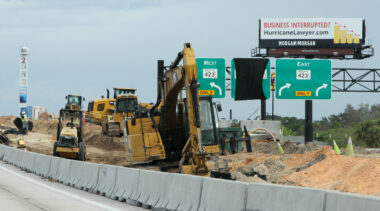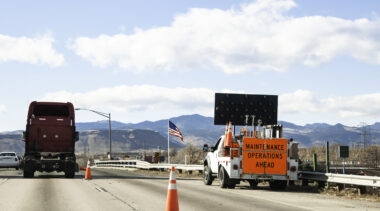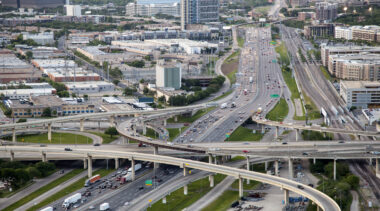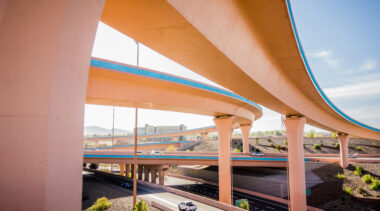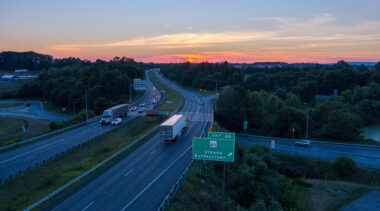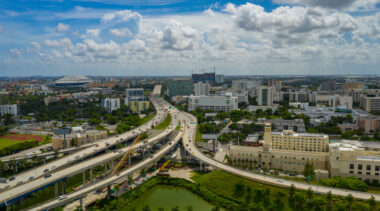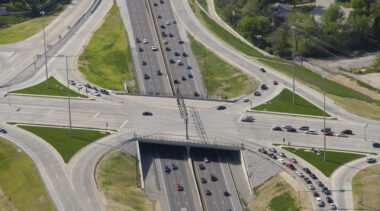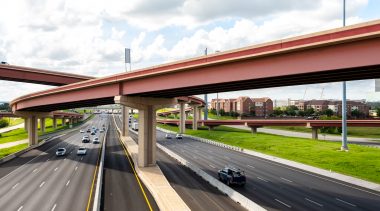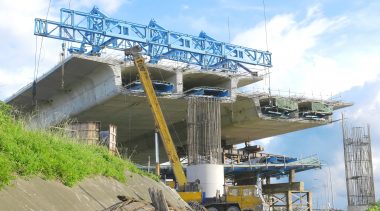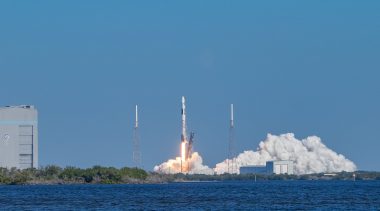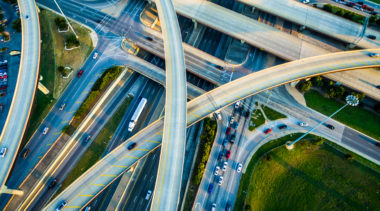Robert Poole is director of transportation policy and Searle Freedom Trust Transportation Fellow at Reason Foundation.
Poole, an MIT-trained engineer, has advised multiple presidential administrations and transportation departments on infrastructure issues.
Surface Transportation
In the field of surface transportation, Poole has advised the Federal Highway Administration, the Federal Transit Administration, the White House Office of Policy Development, National Economic Council, Government Accountability Office, and state Departments of Transportation in numerous states.
Poole's 1988 policy paper proposing privately financed toll lanes to relieve congestion directly inspired California's landmark private tollway law (AB 680), which authorized four pilot toll projects including the successful 91 Express Lanes in Orange County. More than 20 other states and the federal government have since enacted similar public-private partnership legislation. In 1993, Poole oversaw a study that coined the term HOT (high-occupancy toll) Lanes, a term which has become widely accepted since.
California Gov. Pete Wilson appointed Poole to the California's Commission on Transportation Investment and he also served on the Caltrans Privatization Advisory Steering Committee, where he helped oversee the implementation of AB 680.
From 2003 to 2005, he was a member of the Transportation Research Board's special committee on the long-term viability of the fuel tax for highway finance. In 2008 he served as a member of the Texas Study Committee on Private Participation in Toll Roads, appointed by Gov. Rick Perry. In 2009, he was a member of an Expert Review Panel for Washington State DOT, advising on a $1.5 billion toll mega-project. In 2010, he was a member of the transportation transition team for Florida's Governor-elect Rick Scott. He is a member of two TRB standing committees: Congestion Pricing and Managed Lanes.
Aviation
Poole is a member of the Government Accountability Office's National Aviation Studies Advisory Panel and he has testified before the House and Senate's aviation subcommittees on numerous occasions. Following the terrorist attacks of Sept. 11, 2001, Poole consulted the White House Domestic Policy Council and the leadership of the House Transportation & Infrastructure Committee.
He has also advised the Federal Aviation Administration, Office of the Secretary of Transportation, White House Office of Policy Development, National Performance Review, National Economic Council, and the National Civil Aviation Review Commission on aviation issues. Poole is a member of the Critical Infrastructure Council of the Los Angeles Economic Development Corporation and of the Air Traffic Control Association.
Poole was among the first to propose the commercialization of the U.S. air traffic control system, and his work in this field has helped shape proposals for a U.S. air traffic control corporation. A version of his corporation concept was implemented in Canada in 1996 and was more recently endorsed by several former top FAA administrators.
Poole's studies also launched a national debate on airport privatization in the United States. He advised both the FAA and local officials during the 1989-90 controversy over the proposed privatization of Albany (NY) Airport. His policy research on this issue helped inspire Congress' 1996 enactment of the Airport Privatization Pilot Program and the privatization of Indianapolis' airport management under Mayor Steve Goldsmith.
General Background
Robert Poole co-founded the Reason Foundation with Manny Klausner and Tibor Machan in 1978, and served as its president and CEO until the end of 2000.
He was a member of the Bush-Cheney transition team in 2000. Over the years, he has advised multiple presidential administrations on transportation policy.
Poole is credited as the first person to use the term "privatization" to refer to the contracting out of public services and is the author of the first-ever book on privatization, Cutting Back City Hall, published by Universe Books in 1980. He is also editor of the books Instead of Regulation: Alternatives to Federal Regulatory Agencies (Lexington Books, 1981), Defending a Free Society (Lexington Books, 1984), and Unnatural Monopolies (Lexington Books, 1985). He also co-edited the book Free Minds & Free Markets: 25 Years of Reason (Pacific Research Institute, 1993).
Poole has written hundreds of articles, papers, and policy studies on privatization and transportation issues. His popular writings have appeared in national newspapers, including The New York Times, The Wall Street Journal, USA Today, Forbes, and numerous other publications. He has also been a guest on network television programs such as Good Morning America, NBC's Nightly News, ABC's World News Tonight, and the CBS Evening News. Poole writes a monthly column on transportation issues for Public Works Financing.
Poole earned his B.S. and M.S. in mechanical engineering at the Massachusetts Institute of Technology (MIT) and did graduate work in operations research at New York University.
-
How to Increase Public Pension Fund Investment in U.S. Infrastructure
Public pension systems are increasingly seeking reliable long-term investments in revenue-generating infrastructure, such as airports, seaports, and tolled roads and bridges.
-
How to Pay for Rebuilding and Modernizing America’s Aging Interstates
Congress has shown little interest in addressing the need to repair and modernize America’s most important highways.
-
Why Texas Conservatives Should Support Private Investment in Transportation
Private investment funds are ready, willing, and able to invest in U.S. infrastructure.
-
How to Effectively Fund Infrastructure Projects in the United States
Open the door to hundreds of billions in private capital from investors like public pension funds. That will help build infrastructure back better.
-
The Beltway, I-270 Toll Projects Protect Taxpayers In Ways the Purple Line Deal Did Not
Maryland legislation could cause private infrastructure funds to shift their focus—and much-needed money for transportation megaprojects— to other states.
-
The Basic Disconnect Emerging In U.S. Highway Policy
Planning the next-generation highway and transit systems must take into account the transition to electric and automated vehicles.
-
Return the Highway Trust Fund to its Original Users-Pay/Users-Benefit Principle.
Virtually all of the so-called shortfall in the Highway Trust Fund is due to Congress spending money on non-highway programs.
-
Defending the Equity Implications of Priced Managed Lanes
There is new empirical evidence that low-income users benefit significantly from priced managed lanes.
-
Should Every Road Be a Complete Street?
Part five of Reason's Debatable Ideas series examines if complete streets are compatible with the high-speed, multi-modal mobility that major urban arterials are supposed to provide.
-
Debatable Ideas: Examining Key Transportation Issues, Myths and Misconceptions
In this series, Reason's transportation policy analysts examine key infrastructure issues, including common myths and misconceptions found in today's policy debates.
-
Can Increasing Highway Capacity Be Effective?
In part two, Reason's Debatable Ideas series examines claims about the induced demand and the so-called "iron law of freeway congestion."
-
How to Make Public-Private Partnerships Part of a Bipartisan Infrastructure Bill
Those hoping for a major infrastructure bill that expands the country's use of public-private partnerships (P3s) know it will require the next transportation bill to be truly bipartisan.
-
A Tale of Two Space Launch Vehicles
The contrast between NASA and SpaceX launch vehicles is profound and points the way toward increased, and lower-cost, access to space.
-
Increasing the Use of Private Activity Bonds for Infrastructure Projects
It is time to think bigger about the potential for private investment in transportation infrastructure.
-
A New Challenge to U.S. Highway Public-Private Partnerships
A revenue-risk concession is a highway business, which has the kind of direct customer-provider relationship that you have with your cell-phone company and other service providers.
-
On High-Speed Rail, Look at the Costs and Results Before You Leap
President-elect Joe Biden has talked about a “rail revolution” that would include large increases in funding for Amtrak and potentially coast-to-coast high-speed rail service.
-
How Public-Private Partnerships Can Help Truckers and Highways
Long-term toll concessions, like one proposed in Denver, are the trucking industry’s best hope for achieving its goal of a rebuilt and modernized Interstate highway system.
-
It’s Time For More Private Investment in Transportation Infrastructure
Other countries are far ahead of the United States in routinely tapping private investment via long-term public-private partnerships.

